23 May2019
By Jamie Hipp

The views expressed in this post do not necessarily reflect the views of AACTE.
Teacher educators love to talk. We lecture, provide oral directions, read passages aloud, ask countless questions, and verbally redirect. In addition to the auditory quality of teaching, we have also mastered the visual. Anchor charts, word walls, and mnemonic device posters are endemic in teacher preparation classrooms today as we dutifully prepare the next generation of teachers. Graphic organizers, mind maps, color-coding, and visual aids are also ubiquitous. In the never-ending struggle to meet the needs of all learners, the partiality toward auditory and visual aspects of teaching is biased against students (both adult learner and their future PK-12 students) who do not prefer to learn within those modalities.
21 May2019
By Brandon R.T. Frost
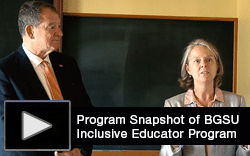 AACTE is excited to share the latest videos of its Research-to-Practice Spotlight Series on Special Education this spring. The video interviews feature faculty, students, and school district leaders who work with Portland State University (Portland, OR) and Bowling Green State University (Bowling Green, OH) to implement extensive clinical preparation for teacher candidates pursuing careers in general and special education. The link to view the video series is now available!
AACTE is excited to share the latest videos of its Research-to-Practice Spotlight Series on Special Education this spring. The video interviews feature faculty, students, and school district leaders who work with Portland State University (Portland, OR) and Bowling Green State University (Bowling Green, OH) to implement extensive clinical preparation for teacher candidates pursuing careers in general and special education. The link to view the video series is now available!
In my recent blog post, I shared a brief introduction to the new Research-to-Practice Spotlight Series. The videos highlight exemplary practices of the two teacher preparation programs for ensuring their candidates are ready to work with all students, including students with disabilities. Though different in many programmatic elements to address their local contexts, each university designed their programs to equip all teachers with the skills necessary to instruct the diverse needs of their student population.
The Master’s Program in Secondary Dual Education at Portland State University features dual certification in both general and special education at the secondary level. Entrants to the program come with an undergraduate degree in a content area and engage in two years of extensive and increasing involvement in clinical settings in secondary schools. Principals consider the program transformative in terms of the skills graduates bring to their classrooms.
20 May2019
By Jane E. West
This blog post is written by AACTE consultant Jane West and is intended to provide update information. The views expressed in this post do not necessarily reflect the views of AACTE.
Today marks the 65th Anniversary of the Brown vs. Board of Education Supreme Court landmark decision that established the principle that separate is not equal. How far have we come? Much to contemplate here. You will see below that a House education panel spoke loud and clear on that topic: we have a long way to go.
- Trump Proposes Taking More Funds from Pell Grants – to Fund Moonshot? Huh?
This week President Trump submitted to Congress some revisions to his original budget request. Notably, he took back the proposed cut he originally made for Special Olympics (after great bipartisan outrage); but he also added a new cut in the form of an additional $1.9 billion to the Pell grant surplus. It appears that the Pell cut would go toward funding the President’s proposed 2024 NASA moonshot! Education advocates were outraged. As Jon Fansmith of the American Council on Education put it: “Do I want to make college more expensive to fund space travel to the moon and Mars?” Hmmmm …
The President had already requested a $2 billion cut in Pell funding. So the total $3.9 billion recission would result in the Pell surplus being exhausted by 2022! This request is likely to be ignored on Capitol Hill, as no one—Republican or Democrat—ever really contemplated cutting Special Olympics. And while the Pell Surplus has been modestly raided in the past, a $3.9 billion cut is highly unlikely.
08 May2019
By Erica D. McCray

The CEEDAR Center will present Culturally responsive education: A course enhancement module (CEM) designed to ensure every educator meets the needs of each learner on Tuesday, May 21, 1:00 p.m. (ET). Registration is now open.
The CEEDAR Center, an OSEP-funded technical assistance center is proud to collaborate with national organizations, technical assistance centers, and stakeholders across the country to ensure that every student with a disability has an equitable opportunity to achieve. Teacher and leader development through policy, preparation, and program improvement is central to our mission. Our partnership with AACTE provides an opportunity to support AACTE’s strategic focus on Diversity, Equity, and Inclusion.
06 May2019
By JTE Insider

Read the latest JTE Insider blog interview by the Journal of Teacher Education (JTE) editorial team. This blog is available to the public, and AACTE members have free access to the articles in the JTE online archives—just log in with your AACTE profile.
This interview features insights from Melanie M. Acosta, author of the JTE article “The Paradox of Pedagogical Excellence Among Exemplary Black Women Educators.” The article is published in the Jan/Feb 2019 issue of the Journal of Teacher Education.
Q1. What motivated you to pursue this particular research topic?
I was compelled to study the professional experiences of exceptional Black women educators for many reasons. One of the most important reasons was related to my own positionality as a Black woman educator with a record of success in teaching. Another crucial reason I wanted to pursue research on Black women educator professional experiences was related to expanding and complicating the dialogue on diversifying the teaching force to focus on issues affecting Black teacher retention, which includes teachers’ positionalities and the treatment of Black women educators in schools.
02 Apr2019
By Katrina Norfleet
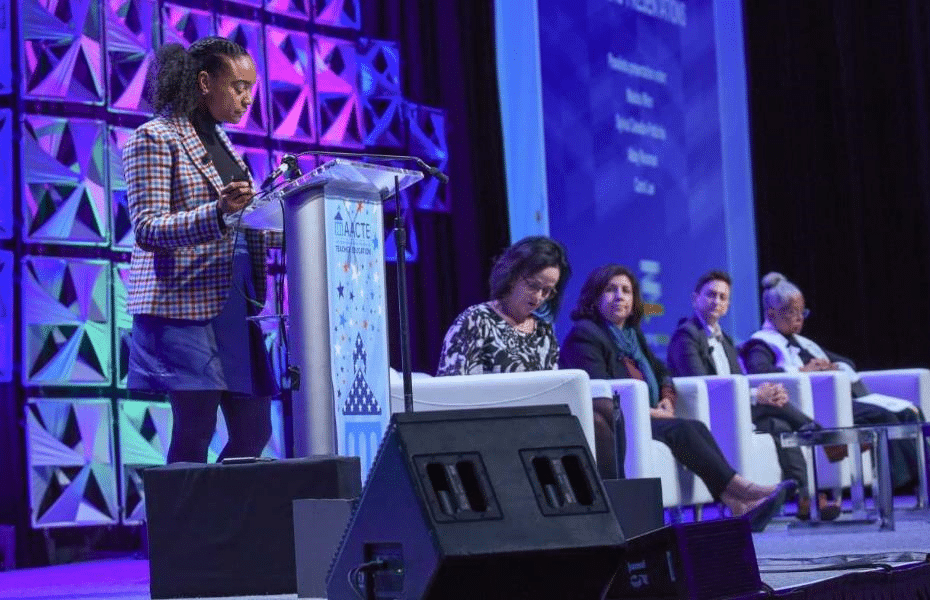
During the “Disrupting the Persistence of Oppression” Deeper Dive session, panelists explored the question: How does knowing content matter for disrupting the persistence of oppression? The panel discussion was moderated by Deborah Ball, director of TeachingWorks at the University of Michigan and included Maisha Winn, Chancellor’s Leadership Professor in the School of Education and co-director of the Transformative Justice in Education (TJE) Center at the University of California, Davis; Sylvia Celedon-Pattichis, senior associate dean for research and community engagement and professor of bilingual and mathematics education at the University of New Mexico; Abby Reisman, assistant professor of teacher education at the University of Pennsylvania; and Carol Lee, former Edwina S. Tarry Professor of Education, School of Education, of Social Policy and African-American Studies at Northwestern University.
Winn began the panel discussion with a scholarly presentation focused on restorative justice and shared a narrative framework she developed for teachers to consider when seeking justice in the school setting. The framework is based on four pedagogical stances: history matters, race matters, justice matters, and language matters. She presented the framework and shared her desire to add a fifth stance: futures matter.
02 Apr2019
By Ward Cummings
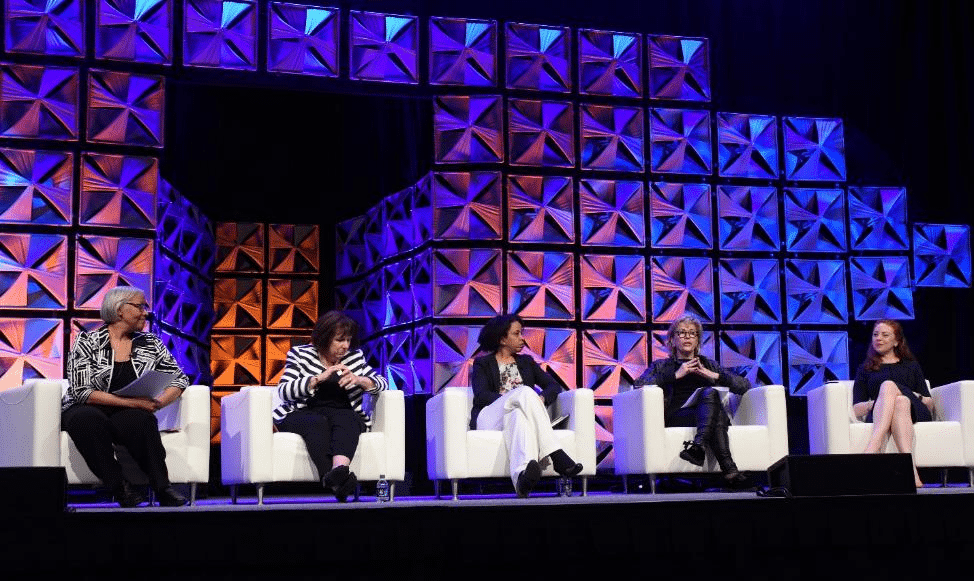
The “AACTE Initiatives toward Increasing Diversity, Equity and Inclusion in Colleges of Teacher Education” Deeper Dive session was held during the 2019 Annual Meeting. The session highlighted the association’s current, ongoing, and future commitments in these areas in a discussion moderated by Jennifer Robinson of Montclair State University and included panelists Lillian Sharon Leathers of William Paterson University of New Jersey and AACTE’s Jacqueline King, Jacqueline Rodriguez, and Jane West.
King, author of AACTE’s recently published Education Students and Diversity: A Review of New Evidence report, described the findings, which showed that education is the least diverse in bachelor’s degree fields. King shared other important data such as 50% of African American education students and 40% of Hispanic education students are independent; 30% of African American students and 20% Hispanic students had children; and 20% African American students were single parents. She emphasized that child care, for example, is an issue that cannot be ignored when considering the matter of diversity. In addition, 4% of Hispanic students are first generation students and 22% do not have a parent that has graduated from high school. The study revealed that one in five African American students work full-time and that the median family income of white, dependent students is more than double of their African American and Hispanic peers.
02 Apr2019
By Jerrica Thurman
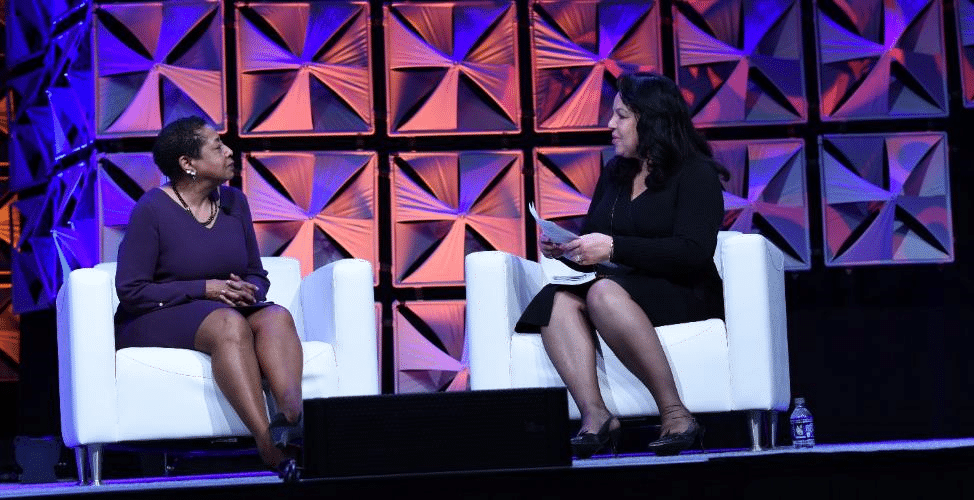
Annual Meeting Closing keynote speakers Mary Dilworth, editor of Millennial Teachers of Color, and Leslie Fenwick, dean emerita of Howard University, presented the topic, “Millennial Teachers of Color: Follow Their Lead, They Know Where We Need To Be,” on Sunday, February 24. During the session, the educators explored millennial teachers through a new lens by examining the intersection of race ethnicity and generation.
Dilworth has centered her career on teacher quality and preparation, with a keen focus on racial/ethnic and linguistic diversity and equity issues. Recently, she was a co-principal investigator for the National Science Foundation (NSF-DR12) project designed to recruit, prepare, license, and employ middle and high school science teachers from underrepresented groups. In addition, she served as a visiting professor and director of the Center for Urban Education at the University of the District of Columbia. Earlier in her career, she was a research fellow with Howard University’s Institute for the Study of Educational Policy (ISEP) and became widely recognized for heightening the national discourse on the disparate impact of licensing tests on underrepresented groups.
01 Apr2019
By Deondra Gladney and Stephanie Jones-Fosu
The AACTE Holmes Scholars Program recently welcomed two new members: University of North Carolina at Charlotte (UNCC) doctoral students Stephanie Jones-Fosu and Deondra Gladney. The two Scholars share their experience as first-time AACTE Annual Meeting and Holmes Preconference attendees.
Stephanie’s Reflection
The Holmes Scholar Program is designed to provide equitable opportunities to emerging scholars from underserved populations. By having the distinct opportunity to be one of first Holmes Scholars from UNCC, an entire level of educational greatness has been literally dropped in my lap. During the 2019 AACTE Annual Meeting in Louisville KY, the Holmes Program created an exclusive preconference event where Holmes students at various levels of education came together to learn and grow from Scholars around the country.
29 Mar2019
By Chandra Floyd
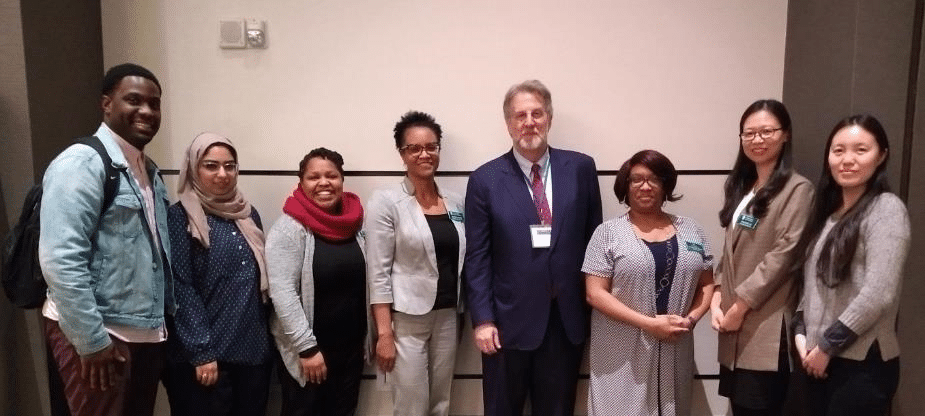
Spencer Niles, dean of the School of Education, College of William & Mary poses with Holmes Scholars (L-R) Okenna Egwu, Leila Warraich, Jessica Scott, Denise Lewis, Chandra Floyd, Jingjing Liu, Shuhui Fan
Twelve College of William & Mary (W&M) Holmes Scholars attended the Holmes Scholars Annual Meeting in Louisville, KY in February as part of the 71st American Association of Colleges for Teacher Education (AACTE) Annual Meeting. The AACTE Holmes Program encourages diversity in education by providing mentorship opportunities to students from high school through doctoral programs who are interested in careers in education. William & Mary’s 14 current Holmes Scholars are high-achieving doctoral students from populations underrepresented in higher education.
07 Mar2019
By Barbara Baals
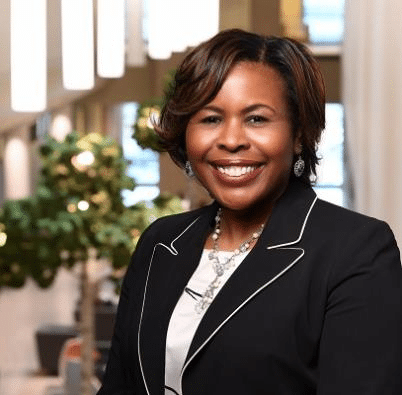 This article on AACTE Board of Director Monika Williams Shealey and accompanying photo originally appeared in Rowan Today and are reprinted with permission.
This article on AACTE Board of Director Monika Williams Shealey and accompanying photo originally appeared in Rowan Today and are reprinted with permission.
Monika Williams Shealey has been named senior vice president of the newly created Division of Diversity, Equity and Inclusion at Rowan University.
Shealey, who joined Rowan as dean of the College of Education in 2013, will oversee a division that brings together departments and programs to develop initiatives designed to address issues of access, equity and inclusion across all of the University’s campuses.
“Under Dr. Shealey, the Division of Diversity, Equity and Inclusion will be tasked with making Rowan a model institution—a University where diversity is valued and equity and inclusion are routine,” Rowan President Ali A. Houshmand said in announcing Shealey’s appointment.
05 Feb2019
By Jerrica Thurman
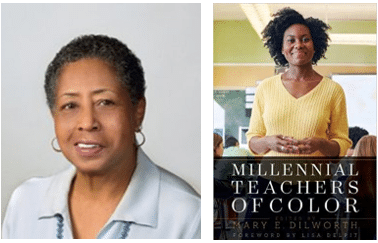 AACTE is delighted to announce the selection of Millennial Teachers of Color, by Mary E. Dilworth to receive the 2019 AACTE Outstanding Book Award. The award will be presented at the AACTE 71st Annual Meeting Closing Session, February 24, in Louisville, KY.
AACTE is delighted to announce the selection of Millennial Teachers of Color, by Mary E. Dilworth to receive the 2019 AACTE Outstanding Book Award. The award will be presented at the AACTE 71st Annual Meeting Closing Session, February 24, in Louisville, KY.
The volume, published in 2018 by Harvard Education Press, explores the opportunities and challenges for creating and sustaining a healthy teaching force in the United States. Millennials are the largest generational cohort in American history, with approximately 90 million members and, of these, roughly 43 percent are people of color. This publication offers a fresh look at these millennials and explores their views of the teaching profession, focuses attention on their relation to schools and teaching and considers how these young teachers feel about teaching for social justice.
05 Feb2019
By Jerrica Thurman
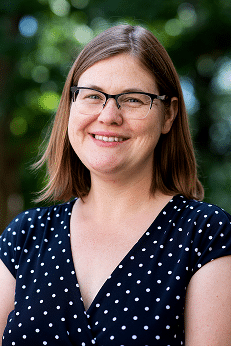 AACTE will honor announced Emily Evans Fanaeian as the recipient of the 2019 AACTE Outstanding Dissertation Award for Preparing Pre-service Teaches for Working with Linguistically Diverse Students: Examining University Teacher Preparation Programs Across the United States. The author completed her dissertation for the Ph.D. at the University of Wisconsin-Madison School of Education and is now the interim director of English as a Second Language/Bilingual Graduate Programs for the School of Education at Edgewood College (Madison, WI). She will be recognized formally with the award at the AACTE 71st Annual Meeting, February 22-24, in Louisville, KY.
AACTE will honor announced Emily Evans Fanaeian as the recipient of the 2019 AACTE Outstanding Dissertation Award for Preparing Pre-service Teaches for Working with Linguistically Diverse Students: Examining University Teacher Preparation Programs Across the United States. The author completed her dissertation for the Ph.D. at the University of Wisconsin-Madison School of Education and is now the interim director of English as a Second Language/Bilingual Graduate Programs for the School of Education at Edgewood College (Madison, WI). She will be recognized formally with the award at the AACTE 71st Annual Meeting, February 22-24, in Louisville, KY.
In her dissertation, Evans Fanaeian designed an ambitious multiple case study to examine the ways in which university-based teacher education programs take up the task of preparing general education teacher candidates to provide instruction to English learners. The University of Wisconsin-Madison Director of Teacher Education Center, Kimber Wilkerson, explained: “Dr. Evans Fanaeian’s dissertation research provides many important implications for teacher education. Acknowledging the importance of preparing general educators to meet the needs of the wide diversity of learners in our schools, Dr. Evans Fanaeian designed an ambitious multiple case study to examine the ways in which university-based teacher education programs take up the task of preparing general education teacher candidates to provide instruction to English learners. In this study, she surfaces the very real local and contextual constraints that teacher educators face when attempting to add complexity to teacher preparation programs. This is particularly important at a time when teacher preparation programs face pressure to reduce the time and cost toward degree. Dr. Evans Fanaeian’s research provides insightful guidance to teacher educators considering different approaches to incorporating new content. Her recommendations for practice are thoughtful as well as pragmatic, and could be applied conceptually to other types of expertise beyond educating English learners.”
14 Jan2019
By Jerrica Thurman
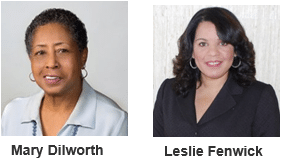 AACTE is pleased to announce the keynote speakers for the 71st Annual Meeting Closing Session are Mary Dilworth, editor of Millennial Teachers of Color, and Leslie Fenwick, dean emerita of Howard University. The session will take place at the Kentucky International Convention Center on February 24, 2019.
AACTE is pleased to announce the keynote speakers for the 71st Annual Meeting Closing Session are Mary Dilworth, editor of Millennial Teachers of Color, and Leslie Fenwick, dean emerita of Howard University. The session will take place at the Kentucky International Convention Center on February 24, 2019.
Join this dynamic duo in a provocative discussion that probes beneath the surface to address how the millennial generation of teachers and those of color, in particular, have become agents of change in education. Discover why the missing link in the recurrent conversation about teacher diversity and inequities is the millennial generation—the most diverse, educated, socially connected, and now largest generation in the workforce.
11 Jan2019
By Jerrica Thurman
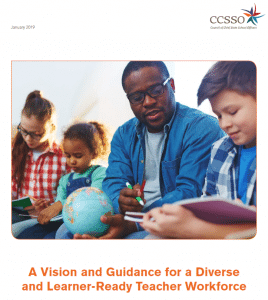 The Council of Chief State School Officers (CCSSO) released yesterday A Vision and Guidance for a Diverse and Learner-Ready Teacher Workforce, a report that outlines key recommendations state education chiefs, leaders in educator preparation, local education agencies, and others can take to ensure each child in the public school system is taught by a diverse and learner-ready teacher workforce. The report highlights actions for attracting, preparing, placing, supporting, and retaining teachers from diverse ethnic or racial backgrounds and socioeconomic experiences. It identifies specific policy levers state education agencies (SEAs) have authority over that should be activated to achieve the vision of what success can look like for students and teachers as well as highlight distinct responsibilities of SEAs where they have a moral imperative to lead for equity. Additionally, the report appendix references some of the best practices and policy recommendations states have implemented to push this work forward.
The Council of Chief State School Officers (CCSSO) released yesterday A Vision and Guidance for a Diverse and Learner-Ready Teacher Workforce, a report that outlines key recommendations state education chiefs, leaders in educator preparation, local education agencies, and others can take to ensure each child in the public school system is taught by a diverse and learner-ready teacher workforce. The report highlights actions for attracting, preparing, placing, supporting, and retaining teachers from diverse ethnic or racial backgrounds and socioeconomic experiences. It identifies specific policy levers state education agencies (SEAs) have authority over that should be activated to achieve the vision of what success can look like for students and teachers as well as highlight distinct responsibilities of SEAs where they have a moral imperative to lead for equity. Additionally, the report appendix references some of the best practices and policy recommendations states have implemented to push this work forward.
Along with state chiefs, AACTE and other national education organizations partnered with CCSSO on its new initiative to diversify the teaching profession through its Diverse and Learner-Ready Teachers (DLRT) Initiative. The collaboration led to the production of the new report—a viable resource for state teams that provide model research- and evidence-based state best practices and policies.















 This article on AACTE Board of Director Monika Williams Shealey and accompanying photo originally appeared in
This article on AACTE Board of Director Monika Williams Shealey and accompanying photo originally appeared in  AACTE is delighted to announce the selection of
AACTE is delighted to announce the selection of  AACTE will honor announced Emily Evans Fanaeian as the recipient of the 2019 AACTE Outstanding Dissertation Award for Preparing Pre-service Teaches for Working with Linguistically Diverse Students: Examining University Teacher Preparation Programs Across the United States. The author completed her dissertation for the Ph.D. at the University of Wisconsin-Madison School of Education and is now the interim director of English as a Second Language/Bilingual Graduate Programs for the School of Education at Edgewood College (Madison, WI). She will be recognized formally with the award at the
AACTE will honor announced Emily Evans Fanaeian as the recipient of the 2019 AACTE Outstanding Dissertation Award for Preparing Pre-service Teaches for Working with Linguistically Diverse Students: Examining University Teacher Preparation Programs Across the United States. The author completed her dissertation for the Ph.D. at the University of Wisconsin-Madison School of Education and is now the interim director of English as a Second Language/Bilingual Graduate Programs for the School of Education at Edgewood College (Madison, WI). She will be recognized formally with the award at the  AACTE is pleased to announce the keynote speakers for the
AACTE is pleased to announce the keynote speakers for the  The
The